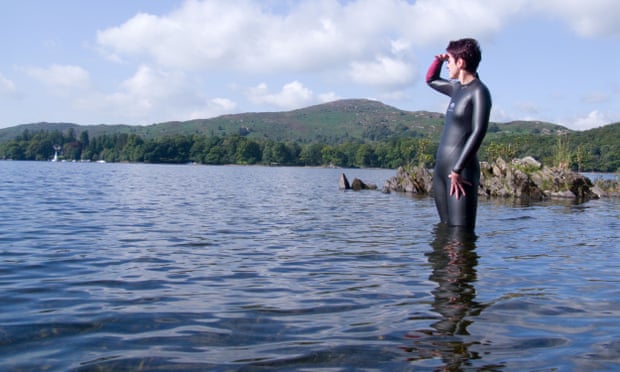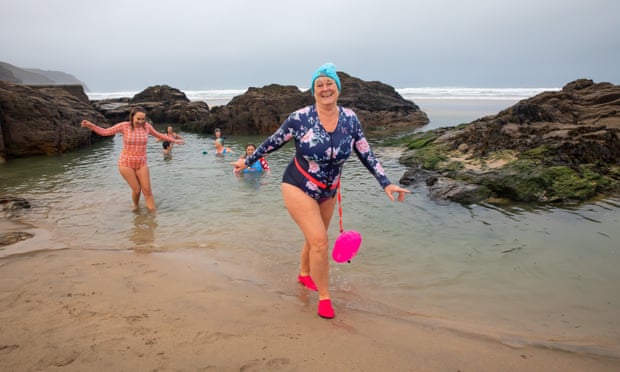Cool off the right way: how and where to enjoy open water swimming safely

Fancy a dip to escape the heatwave? From getting the right kit to joining a group, the key to enjoying wild swimming is preparation
With seemingly no end in sight to Britain’s hot summer days, many of us are looking for different ways to cool down. In cities such as London, open-water venues have been a haven from the stifling weather. Over the past few summers, I’ve found myself travelling all over the city, and the rest of the UK, excited by the prospect of discovering different bodies of water. I’m certainly not the only one; in the past few years participation in open water swimming has surged.
Swimming outdoors doesn’t come without risks, however, and every year we hear tragic stories of swimmers losing their lives after getting into danger in open water. Avoiding such risks does not have to mean staying out of the water altogether, but trying to understand the hazards and having the know how to mitigate difficulties in order to enjoy water safely.
Be prepared
There are a huge number of elements to contend with in open water compared with the comforts of a pool. Bodies of water can look inviting in hot weather, but low temperatures can be a shock to the system, particularly for inexperienced swimmers. Cold water can seriously affect your breathing and movement, so entering slowly and focusing on breathing is key.
Water quality is unfortunately a very real issue in the UK, with sewage leaks in to the sea being a common occurrence, particularly after heavy rainfall. Before heading to the beach, always check the Surfers Against Sewage app for an up-to-date account of the water quality across the UK.
Swim in lifeguarded areas
Going to an accredited, lifeguarded venue is the best bet for first-time open water swimmers. Not only will there be trained professionals there to supervise and assist, but the staff will also take you through an induction before entering the water, so you know what to expect.
When swimming in the sea, choose a lifeguarded beach and swim between the yellow and red flags. Always stay within your depths, swimming parallel to the shore rather than further out.

Go with someone or join a local group
Swimming with someone is always a good idea, regardless of ability. With outdoor swimming increasing in popularity, every month there seem to be new groups popping up across the country, from those focused on casual dipping to more intense training. They often also come with inventive names, such as the Bluetits and SOUP (Sheffield Outdoor Plungers). The Outdoor Swimming Society has a comprehensive list of different groups across the UK and how to get in touch with them.
READ RELATED: Father took his life after death of daughter from a botched bum lift as 'he couldn't get over loss'
Wear the right kit
Visibility is key, so wearing brightly coloured swimming costumes and hats ensures you’ll be seen in the water. A tow float, which ties around your waist and unobtrusively floats behind your body, is a crucial piece of kit to take with you. They are also useful to float on if you experience fatigue or get into difficulty.
Float to live
If you do get in trouble, the best thing to do is fight your instinct to swim out of it, and float on your back to conserve energy and catch your breath before signalling for help. Even the strongest swimmers are no match for the water in rough conditions, and trying to fight against rip tides or currents will lead to fatigue and panic, and the likelihood of getting further in danger.
In case of an emergency, call 999 or 112 and ask for the coastguard. When going out for a swim, particularly in areas with no lifeguards, always carry a means of calling for help, such as a mobile phone in a waterproof pouch.

Four safe and scenic open water swimming spots
West Reservoir, London
Gone are the days where swimming in a reservoir meant jumping in water of a questionable quality and hoping for the best. West Reservoir is a beautiful clean oasis in Hackney, east London. The friendly and knowledgable lifeguards will take you through an induction if it’s your first time. There’s a great cafe on site too – I recommend the Pastéis de Nata.
Perranporth beach, Cornwall
A large lifeguarded beach in north Cornwall. In addition to the sea, there are rock formations dotted around and a small tidal bathing pool for those that want to immerse in water but in a more controlled environment.
Divers Cove, Surrey
A gorgeous 7.3 acre reservoir with a sandy bottom and beautiful turquoise-green water – on very hot days you could imagine you’re in the Mediterranean. There are also hot tubs and saunas on site for some post-swim luxury.
Coniston Water, Lake District
Coniston Water is the third-largest lake in the Lake District, and the northern end is ideal for open water swimmers, with an absence of boat traffic and a gentle slope into the water. There’s also the opportunity to hire canoes, kayaks and paddleboards, making it a fun day out for the whole family.
Omie Dale is Swim England’s Swim Teacher of the Year 2021 and director @swimunity
Source: Health & wellbeing | The Guardian


